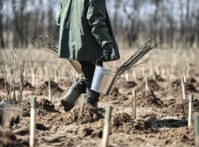-
ECSP Weekly Watch | June 24 – 28
June 28, 2024 By Neeraja Kulkarni
A window into what we are reading at the Wilson Center’s Environmental Change and Security Program
Renewable Energy Needs a Social Vision (Mongabay)
The Zapotec of the Isthmus of Tehuantepec have accused energy giant EDF (Électricité de France) of causing human rights abuses while building wind farms in Oaxaca state. They also claim the company intimidated and harassed social movements who opposed this construction on their ancestral lands. The Zapotec are indigenous peoples of Mexico who call themselves Bën Za or “The People”—and after three years of struggle and stalling tactics by EDF’s legal representatives, French courts have authorized their civil case filing at last.
The Zapotec lawsuit was filed under the French Corporate Duty of Vigilance Law (2017) which aims to hold large French companies accountable for their operations overseas. This measure requires companies to publish an annual “vigilance plan” to identify risks of human rights violations and environmental harm by these firms and their affiliated stakeholders, establish effective measures to prevent them. The European Center for Constitutional and Human Rights observes that residents of the Union Hidalgo region of Oaxaca state are the first Indigenous community to invoke collective land rights under this law. The case is a crucial test case to in determine the effectiveness and judicial reach of the French government regarding transnational supply chain matters.
Community members in the region do reap financial benefits from investments in the project, such as reductions in energy bills. Yet certain negative impacts also have emerged for the Zapotec, including concerns that these investments have limited agricultural practices and affected local food production. The group’s legal representative, Gonzalo Bustillo, said that “this energy doesn’t have a social vision; but a vision for big companies.” He argued that energy interests must add a social lens to their existing economic imperatives, especially in regards to renewable energy.
READ | Indigenous Partnerships Can Bring Progress in LAC Energy Projects
Sudan’s Communal Kitchens Fight Hunger Amidst Conflict (The New Humanitarian)
The ongoing war in Sudan pits the paramilitary Rapid Support Forces (RSF) against its existing national army. Despite efforts from the AU and UN peacekeeping forces, however, the renewed internal conflict which began in 2023 is worsening, with a disproportionate effect on women and children. For instance, the RSF has been accused of using starvation as a weapon of war in Sudan. Its siege of El-Fasher left thousands of civilians to face severe hunger and thirst due to a lack of food and water. The conflict is exacerbating climatic shocks such as floods and prolonged droughts, which adversely affect crop production and increase food insecurity.
Amidst this famine, however, community-led resilience is gleaming as a sign of hope for Sudan’s oppressed population. Communal kitchens that run neighborhood-based mutual aid groups support thousands of people in Khartoum, providing regular meals, as well as social and emotional support. These “emergency response rooms” have two distinct models: religious or community leaders organize to distribute food to people; or independent well-structured kitchens operate in defined spaces.
The kitchens also offer a tangible example of cultural influences in Sudan, and need to integrate them into operations to enhance—or even drive—resilience practices. In Khartoum, a rich heritage of social solidarity is embodied in the tradition of nafeer or “a call to mobilize.” Local kitchen volunteers add their work battling hunger helps them become more resilient to the conflict itself. Yet as the conflict intensifies and international aid is blocked, these workers are calling for increased funding and resources to meet the needs of an ever-increasing displaced population.
READ | Rethinking Population, Climate, and Health: Focusing on Solutions
The Role of AI in Combating Climate Change (Business Day)
The advent of AI has generated a global debate about whether it can support climate action. Climate variability, and forecasting technologies, have been at the center of this debate. Scientists have long deployed large data sets and complex systems, but AI applications now are being explored as solutions to reduce this burden while generating more accurate decisions. And because of its broader reach to satellites and weather sites, AI also can create real-time inferences about climate variability.
Yet relevant AI applications in the climate change space are not limited to climate forecasting and modeling. AI-integrated tech applications also have been booming in the agricultural sector, where smart agri-tech aims to improve irrigation systems and overall management. Energy is another sector where efficient smart grids can help reduce mismanagement on a utility level by creating more accurate consumer demand and supply calculations. AI also can be integrated into urban planning software to plug in smart climate-resilient features.
AI’s promising applications to support climate action do not mean that these “smart” technologies come without ethical concerns. The challenges that AI poses include inbuilt racial biases, faulty algorithms, and data privacy issues that have not been addressed at present. Within the climate action space, these technologies can affect the impartiality of the climatic measures that are translated into policy and programming. AI also can be a “double-edged sword,” since processing such large data sets is an extremely energy-intensive process. Experts emphasize that the multiple drawbacks attached to AI’s impact on climate must be addressed through stringent legal mechanisms before they muddle ongoing efforts and reduce the efficacy of measures to ameliorate climate change.
READ | AI in Community Care: Can Co-design Shift the Balance in Maternal Mortality?
Sources: International Energy Agency (IEA), Care, Office of the United Nations High Commissioner for Human Rights (OHCHR), John Hopkins University (JHU), European Center for Constitutional and Human Rights (ECCHR)
 A Publication of the Stimson Center.
A Publication of the Stimson Center.








